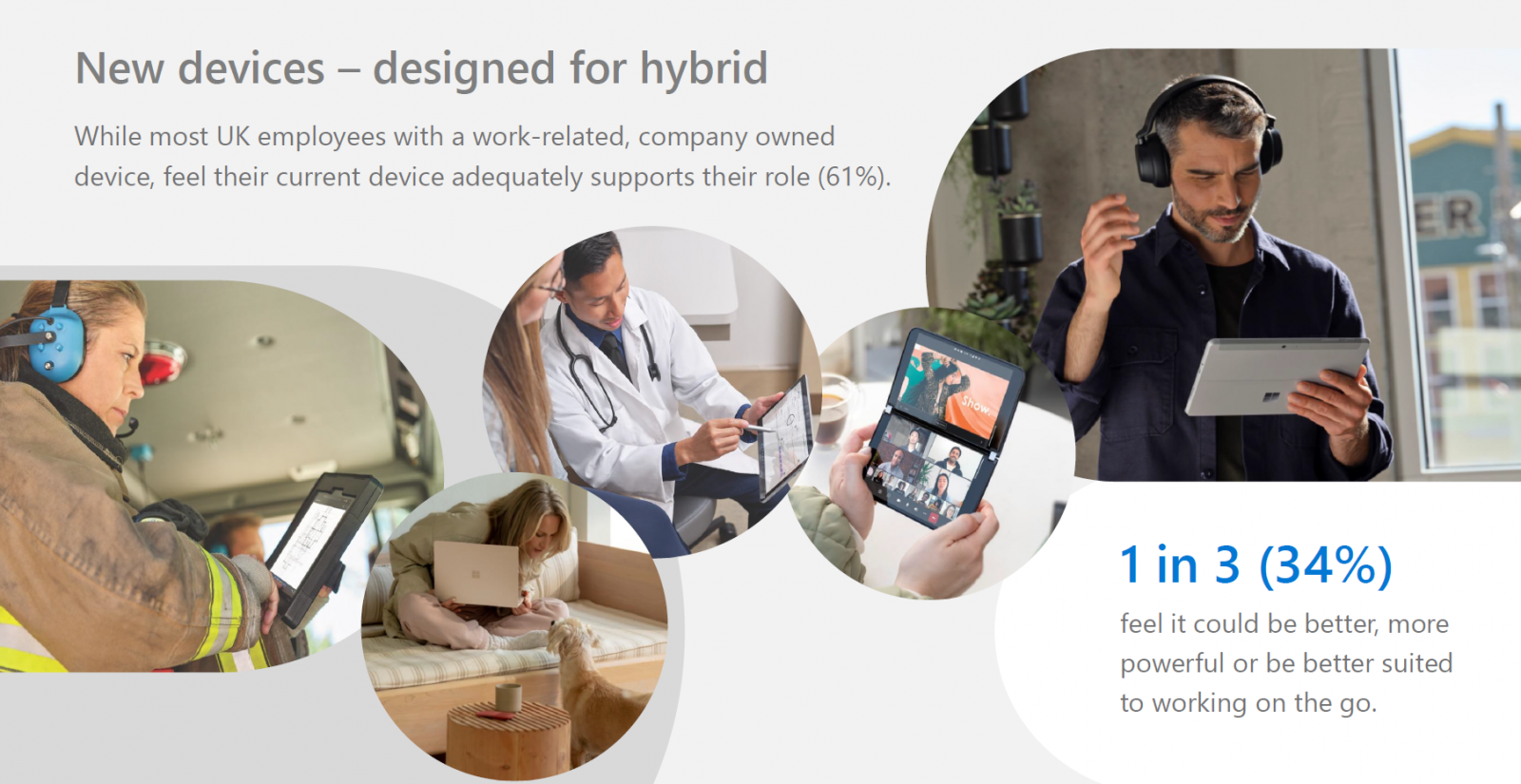Two-thirds of people who work on a laptop or tablet given to them by their employer haven’t had a new device since the COVID-19 pandemic began, raising fears of a productivity gap as staff work from home.
Research from Microsoft Surface, conducted with YouGov, has found that 66% of employees with a work-related, company-owned laptop or tablet have been using the same device since the onset of COVID-19. This figure rises to 71% for frontline workers.
The Microsoft Surface report – entitled Device Decisions, The future is hybrid: considerations for IT leaders in the changing workplace – raises concerns that the lack of device refreshes is hitting productivity.
More than a third (35%) of employees who received new devices since the onset of COVID-19 reported a resulting increase in their productivity. Meanwhile, most employees have “made do” with the same device while working remotely. Employees want upgrades that better suit their individual needs – as-remote working arrangements that started as temporary measures have become the norm. Their company’s IT teams, which initially purchased devices to help staff work from home during the pandemic but then shelved routine upgrades, now feel the same way.
The top five most important features of a new device are aligned across both IT Decision Makers (ITDMs) and employees:
- Reliability (58% of employees, 67% of ITDMs)
- Responsiveness when working (56% of employees, 55% of ITDMs)
- Battery life (45% of employees, 50% of ITDMs)
- Screen size (43% of employees, 40% of ITDMs)
- Boot-up speed (36% of employees, 32% of ITDMs)
ITDMs are also keen to provide their workforces with the accessories needed to support productivity during hybrid working. Thirty percent of ITDMs believe accessories such as an external mouse (10%), spare charger (10%), or docking station (10%) are important to employees engaged in hybrid work. This suggests that jobs no longer require just a single device and employers must think about everything an employee needs to perform, from a wireless keyboard and digital pen, to headphones, earbuds and webcams.
Howard Lewis, Surface Business Group Lead, at Microsoft UK, said: “Few could have predicted the sudden global shift to remote working, and the workplace will keep changing in unexpected ways as technology evolves and organisations everywhere experiment with hybrid models. The insights from this research highlight changing employee expectations about devices, as well as disconnects between IT teams and the staff that they support.”
The Microsoft Surface research, which draws on the views of thousands of UK employees and more than 1,000 ITDMs, reveals that 73% of ITDMs now have the adequate budget they need to support hybrid workers in 2022.
However, employees feel they are not being listened to. Half (51%) of them believe devices are provided based on job role alone – with individual requirements not considered as standard. Only 31% feel their individual needs and accessibility requirements are taken into consideration, a number that drops to just 17% for frontline workers.
There also appears to be some confusion among employees regarding the decision-making process, with nearly three-in-10 employees (29%) admitting they are unsure how devices are allocated. The data suggests that if IT leaders make a point of surveying staff and soliciting their feedback on device requirements, they will discover significant common ground between what employees say they need and what IT wants to deliver. Involving employees in the process will help ensure their requirements are met, as well as potentially improve productivity and positivity towards the company.
Almost three-in-10 employees with a work-related, company-owned device (29%) say receiving a new device would make them feel more positive about their work and employer, while 16% say working on a newer device would increase their motivation.
Additionally, 61% of employees say having the right device for their role helps them maintain a healthy work-life balance by supporting productivity. The message from employees is that they expect to be given efficient devices, not something that just about gets the job done, or slows them down as a result.
Lewis, from Microsoft, added: “We hope this report will illuminate the path toward a future-proof workplace by highlighting the most important considerations for ITDMs as they weigh up device investment decisions. Our goal is to help IT teams meet changing employee expectations and set their organisations up for long-term success, in this new hybrid world of work.”
To learn more about the findings, see the full report below:
https://news.microsoft.com/wp-content/uploads/prod/sites/68/2021/11/Device-Decisions-1.pdf







